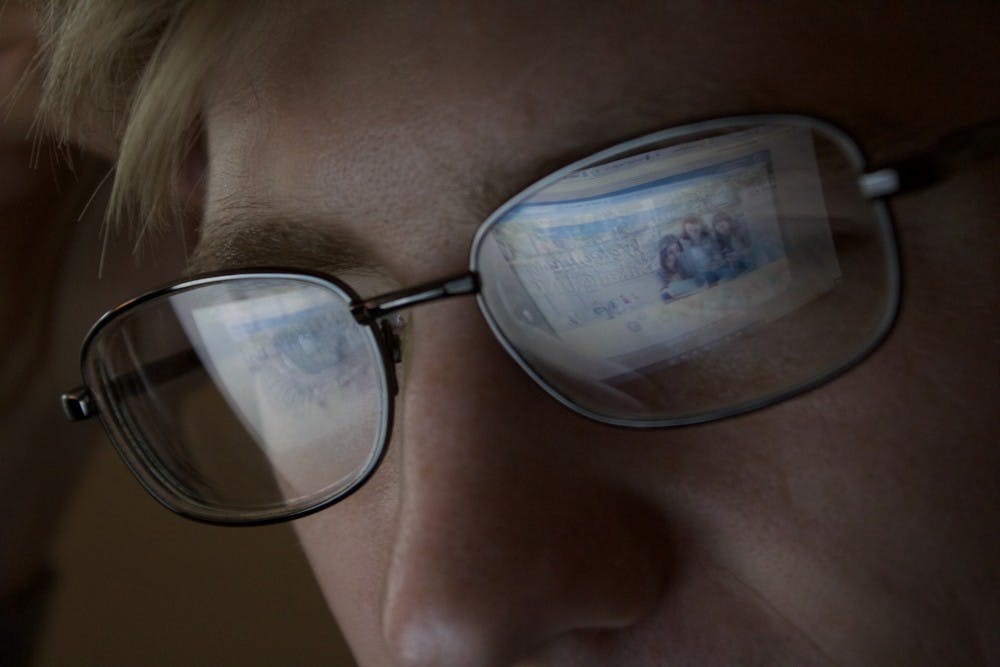Although her courses often make use of computers, Larson notes that they do have their drawbacks.
"There’s always just that risk of missing something because a distraction pops up on the screen,” Larson said. “Just losing the focus of the class ... the availability of information, we have to have a synergy with that and the classroom discussion.”
“It’s a balance”
In the UNC School of Media and Journalism, technological fluency is becoming synonymous with career readiness, as the field of journalism evolves and media goes digital.
“The whole world of journalism is changing because of technology,” said Gary Kayye, a lecturer at the MJ-school. “This is just another technological evolution, and so we have to adapt to it.”
Kayye warns against fearing the advance of new technologies simply because they are new.
“The sort of invasion of social media and new media will ultimately be a big positive because it’ll make everyone more efficient, but because it’s a difference and it’s a change, it’s always scary,” Kayye said, who also teaches a New Media Technologies course.
Kayye acknowledges that technological devices such as laptops or cell phones can be a distraction. But he maintains that ultimately, the decision to stay on task should be up to the students.
“I don’t think it is wise to have a professor tell you to come into a class and turn off all your electronics and pay attention to him or her. I think that that’s not the way the real world works,” Kayye said. “In the real world, when you’re in meetings, you have your phone with you and you have your laptop with you.”
Kayye said integrating technology into classrooms can provide a helpful lesson in multitasking.
“It’s a balance, and the person has to figure out that balance,” Kayye said.
“It detracts from the energy in the room”
To get the day's news and headlines in your inbox each morning, sign up for our email newsletters.
Timothy Ryan, a political science professor, is more wary of assuming his students are able to multitask.
“The problem is that (small distractions such as email), even if it seems innocent enough in the moment, they accumulate — especially when a lot of people are doing that — and it detracts from the energy behind a class discussion,” Ryan said. “It detracts from the energy in the room.”
Ryan, who teaches many discussion-based classes, said he notices it is far more difficult for students to engage fully in a discussion with a screen in front of them.
Nevertheless, Ryan allows laptops in his classrooms, although he states his views on their potential drawbacks at the beginning of class.
Ryan and Kayye are in agreement that the decision should ultimately rest with students as to whether or not they should multitask on their technological devices.
“My job is to … make available to you everything (you need to learn), but ultimately it’s your decision about … how much you want to invest in the experience yourself,” Ryan said.
“In many cases it doesn’t interfere”
Kevin Stewart of the Geological Sciences Department said he doesn’t regard the use of technology as much of an issue in his field.
“In many cases it doesn’t hinder (learning),” Stewart said, who often uses programs such as PowerPoint or Poll Everywhere in the classroom “I think the times where it would hinder is if the student is using their laptop or their phone and they’re doing something other than what’s required for the class.”
But he notes that he doesn’t often have to ask students to put their technology away.
While Stewart said he couldn’t speak for other professors, he says his impression is that technology can be wisely incorporated into the classroom in every field.
“I certainly can imagine that every department on campus could have a class where using technology would be beneficial,” Stewart said.
So even if you are the 97 percent of students that would check their phone during class, professors still seem to think technology in the classroom has more benefits than drawbacks. But ultimately, it’s up to the student to decide when it’s time to close the computer and listen up.
“There’s no question it can be frustrating if a student is shopping on Amazon instead of paying attention in class,” Kayye said. “But ultimately, they’re adults. They get to make that decision, and we have to empower the students to make decisions for themselves — not dictate that they have to do one thing or another.”
university@dailytarheel.com



